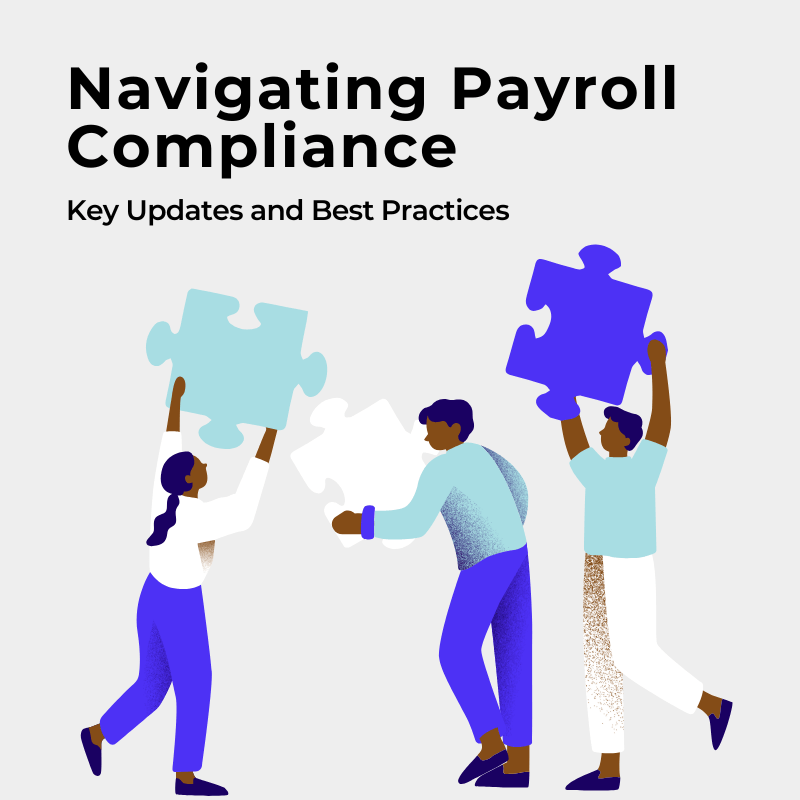Navigating Payroll Compliance in 2025: Key Updates and Best Practices
Last Updated on May 21, 2025 by VantagePoint
Staying compliant with payroll regulations has always been a challenge, but 2025 introduces a new wave of changes that employers must carefully navigate. With evolving labor laws, heightened enforcement, and growing employee expectations, it’s critical for organizations to adapt quickly — or risk costly penalties. The good news? VantagePoint now offers a fully integrated payroll solution that makes managing compliance easier than ever: single source, single data entry point, single resource for payroll, tax payment, time tracking, and benefits administration.
Let’s dive into the key updates you need to know and the best practices that can help you stay ahead.
Recent Changes Shaping Payroll in 2025
Minimum Wage Updates: What Employers Need to Know
The federal minimum wage remains unchanged at $7.25/hour, but many states and cities are pushing forward with significant increases. For example, California’s minimum wage rose to $16/hour as of January 1, 2025 (source), with several cities setting even higher local rates. Employers with multi-state workforces must stay informed about each jurisdiction’s requirements.
Federal Payroll Tax and Benefit Updates
Social Security Wage Base: Increased to $176,100 for 2025. Employers and employees each continue to contribute 6.2% up to this limit.
Health Savings Accounts (HSA):
- Self-only coverage: Limit increased to $4,300.
- Family coverage: Limit increased to $8,550.
- Catch-up contribution (age 55 or older): Remains at $1,000.
Flexible Spending Accounts (FSA):
- Contribution limit increased to $3,300 and carryover limit increased to $660.
Pay Transparency Requirements: Disclosing Salary Ranges
Following trends in states like New York and California, even more jurisdictions now require employers to disclose salary ranges in job postings. For instance, Illinois’ Pay Transparency Act took effect in March 2025 and requires employers with 15 or more employees to include pay scales and benefits in job postings.
Enhanced Payroll Tax Reporting
The IRS is implementing stricter payroll tax reporting requirements to minimize fraud and increase accuracy. Employers will now need to submit tax documentation more frequently and ensure their payroll systems integrate seamlessly with government platforms. The IRS estimates that payroll tax compliance errors cost businesses over $7 billion annually in penalties. Staying current with enhanced reporting standards is critical to avoiding costly mistakes.
IRS Payroll Tax Reporting Enhancements
- Electronic Filing: The IRS now allows electronic filing of amended employment tax returns, including Forms 940 and 941-X. (source: Internal Revenue Service)
- Section 3509 Rates: Employers treating employees as nonemployees may be liable for taxes under special Section 3509 rates, depending on whether required Forms 1099 were filed.
Gig Worker and Contractor Classification Updates
The Department of Labor (DOL) is refining its guidelines for classifying independent contractors versus employees. Misclassifying workers can lead to significant fines and potential legal issues. Companies utilizing gig workers should review their contracts and payroll structures to ensure alignment with the latest classification standards.

Emerging Payroll Compliance Challenges
Managing Multi-State Employment Compliance
The remote work revolution isn’t slowing down. Businesses must register for taxes in every state where employees are working and track evolving local employment laws. It’s a compliance maze that requires careful payroll management and clear communication with employees.
Accurate Time and Attendance Recordkeeping
With new overtime thresholds, precise tracking of work hours is essential. Mistakes in timekeeping not only result in compliance risks but also damage employee trust.
Benefits Integration and Payroll Deductions
Changes to leave policies — such as expanded paid sick leave in several states — impact payroll deductions. Without seamless integration between your HR and payroll systems, errors become inevitable.
Best Practices for Staying Compliant in 2025
1. Automate and Integrate Your Payroll Systems
Manual processes leave too much room for error. Choosing an integrated payroll solution, like VantagePoint’s, eliminates redundant data entry and connects payroll directly to benefits and timekeeping. Investing in reliable, automated payroll services can help businesses stay compliant by tracking regulatory updates, ensuring accurate tax withholdings, and generating real-time compliance reports.
2. Conduct Regular Compliance Audits
Quarterly internal audits can catch errors before they become legal issues. Reviewing employee classifications, tax filings, time records, and benefit deductions is time-consuming. When choosing to work with us, we take care of all compliance audits so you can focus on your business.
3. Stay Informed with Regulatory Updates
Assign a team member or partner with a service that monitors local, state, and federal updates. Sources like SHRM’s Workplace Compliance offer valuable insights. VantagePoint’s integrated payroll solution does all this for you.
4. Communicate Payroll Policies Clearly to Employees
Create an open dialogue about timekeeping, pay transparency, and compliance. Well-informed employees help ensure accurate recordkeeping and foster trust.

Simplify Payroll Compliance with VantagePoint’s Integrated Solution
VantagePoint’s integrated system covers every critical aspect of payroll and HR compliance:
- Payroll Administration
- Tax Payment and Reporting
- Time and Attendance Tracking
- Benefit Administration
With VantagePoint, you benefit from:
- Single Source: One platform for all your HR and payroll needs.
- Single Data Entry Point: Enter information once — eliminate redundant work.
- Single Resource for Support: One trusted partner for all your questions and needs.
Integration drastically reduces human errors, ensures real-time compliance updates, and empowers your team to focus on what matters: growing the business.
Looking for more ways to future-proof your HR processes? Check out our recent post!
Prepare Your Payroll for 2025 and Beyond
Payroll compliance is evolving fast — but with the right strategy and technology, your business can stay ahead. Ignoring updates could result in heavy penalties and reputational damage. Now is the time to streamline your processes, audit your systems, and lean on expert support.
Don’t let payroll compliance catch you off guard. Contact VantagePoint today and experience a smarter, simpler way to manage payroll.


